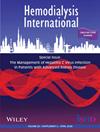The knowledge, attitudes, and practices of arteriovenous access assessment among hemodialysis nurses: A multicenter cross-sectional survey
Abstract
Introduction
Hemodialysis nurses' cannulation technique, monitoring, and management methods can affect patients' vascular access longevity. An arteriovenous access assessment comprises a medical history and vascular assessment through physical examination and surveillance. However, further exploration is needed to fully understand hemodialysis nurses' knowledge, attitudes, and practices (KAP) in this area.
Methods
Between June and July 2023, we recruited hemodialysis nurses from 21 cities in Guangdong Province using a convenience sampling method. Four questionnaires—the General Data Questionnaire, the KAP Scale of Arteriovenous Access Assessment among Hemodialysis Nurses, the Utrecht Work Engagement Scale, and the NASA Task Load Index—were utilized for data collection through the Questionnaire Star platform.
Findings
Of the 530 hemodialysis nurses participating in the study, 458 (86.4%) had a valid response. The participants demonstrated moderate knowledge and practice levels regarding arteriovenous access assessment and exhibited positive attitudes. We identified several factors related to arteriovenous access assessment that predict KAP in hemodialysis nurses. These factors included years of experience as a hemodialysis nurse, whether a nurse's knowledge of physical examination was sufficient to meet clinical needs, whether a nurse had received training in performing physical examination, whether a nurse's department regularly checked the quality of physical examination, and nurses' levels of work engagement and mental workload. All factors explained 32.4% of the variance in participants' KAP regarding arteriovenous access assessment.
Discussion
Improving hemodialysis nurses' assessment of arteriovenous access is crucial to ensure optimal patient care. Dialysis center managers and educators should prioritize understanding hemodialysis nurses' KAP of arteriovenous access assessment and any factors influencing these areas.

 求助内容:
求助内容: 应助结果提醒方式:
应助结果提醒方式:


